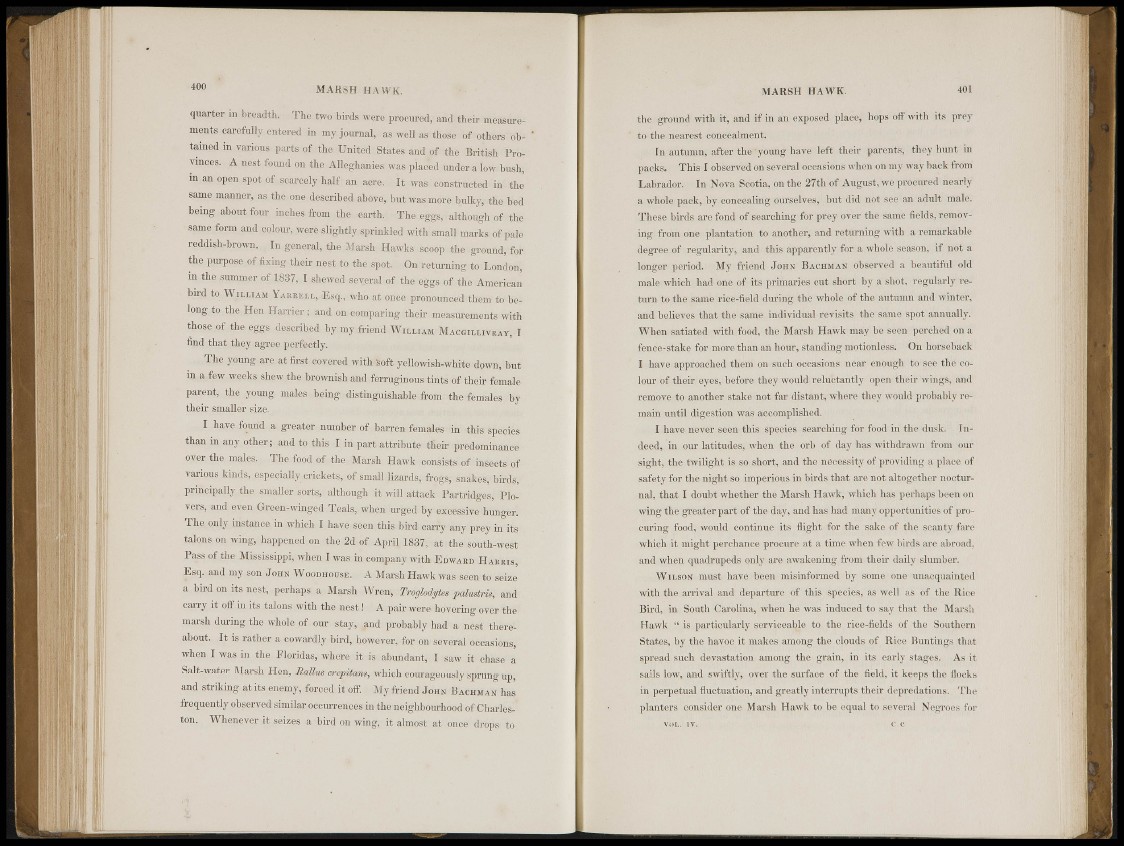
400 MARSH HAWK.
quarter in breadth. The two birds were procured, and their measurements.
carefully entered in my journal, as well as those of others ob-
U i m ! ' 1 vari," ' s of the United States and of the British !•,„-
;T#te»f, A nest found on the ASeghanies was placed under a low bush,
in an open spot of scarcely half an acre. It was. constructed in the
same manner, as the. one described above, but was more bulky, the bed
being about four inches from the earth The eggs, although of the
same/form and colour; were slightly sprmkled with small marks of pale
reddish-brown. In general, the Marsh Hawks scoop the ground, for
the purpose..«!' fixing their nest to the spot. On returning to London,
in the summer of 1837, I shewed several of the eggs of the American
K F * T 0 WILLIAM YAEKKLL, Esq, who a t once pronaraced them to befeW0
% Hen Harrier ; and on comparing their measurements with
t h o s e of t h e eggs described by my friend W I L L I A M MACGII.MVUAV-, I
find that they agree perfectly.
, The .young are at first covered with «oft yellowish-» hite down, but
i»,.a few weeks shew the brownish and ferruginous tints of their female
I, a r t 'nt> #«>»g males being distinguishable from the females i f
their smallor^zihj^.
„,¿1. havo./ouiid a greater mnnbor of, barren female.-; i s Aft s p g j S
than in any other,; and to this I in part attribute ¿heir predominance
0 T e r males. The food of the Marsh Hawk consists of insects of
various kinds, especially crickets, of small: lizards, frogs, snakes, birds,
principally the smaller sorts, although it wiS attack Partridges, I'lo-
Vejjs,-and,even Green-wingedTeals,.when urged by excessive hunger.
The only instance in which I have seen this bird early any p r e y » its
talons on wing, happened on, the 2d of April: lS37," at the south-west
Pass of the Mississippi, when I was in company with E I JFEUM HARRIS,
' P I T and. my son JOBS WOOBBOUTSE. A Marsh Hawk was seen to seize
a bird on its nest, perhaps a Marsh Wren,. Troglodytes palustrh, and
carry i t of in its talons with the nest! Apair were hovering over
marsh during Ihe whole- of our stay, ¡and probably had1 a nest thoreabout.
It is rather a cowardly bird, however, for on' several occasions,
when, I was in the Ploridas, where it is abundant, I saw it chase a
Salt-water Marsh Hon, liallm crepitant, which courageously spiting up,
and striking at its enemy,, forced it off. : My friend JOHN BACBMAN has
frequently observed similar occurrences in the neigbbonrhood of Charles-
10,1 • Whenever it seizes, a bird on wing, it almost at once drops, to
M A R S H HAWK 401
lho ground with it, and if in an exposed place, hops off with its prey
to the nearest concealment.
In autumn, after the-young have left their parents, they hunt in
packs. This I observed on several occasions when on my way back from
Labrador. In Nova Scotia, on the 27th of August, we procured nearly
a whole: pack, by concealing ourselves, but did not: see an adult male.
These birds ¡are fond of searching, far prey over the same fields, removing
from one plantation to another; and returning with a remarkable
degree of regularity, and this apparently for.a whole season, if not a
longSf period. My friend JOHN BACHMAN observed a beautiful old
male vvhich had one of its primaries cut short by a sbBt, regularly return
to the s&n» rice-field during the whsfe of the autumn and winter,
and believes that the same individual revisits the, same Spot annually.
When satiated with food, the Marsh Hawk may be seen perched on a
fencefStake for more than an i p f c standing motionlessi On horseback
iffljhave approached them on such occasion? near enough to see the colour
of', their eyes, before they would reluctantly open their wings, and
remove to another stake not far distant, where they would probably remain
until digestion was accomplished.
I havewever is®®a this species searching for food in the dusk. Indeed,
in our latitudes, when the orb of day has withdrawn from our
sight, the twilight is. so short, and the necessity of providing a place of
safety for the night so imperious in birds that are not altogether nocturnal,
that I doubt whether the Marsh Hawk, which has perhaps been on
wing the greater part of the day, and has had many opportunities of procuring
food, would continue its flight for the sake of the scanty fare
which it might perchance procure at a time when few birds are abroad,
and when quadrupeds only are awakening from their daily slumber.
W I L S O N must have been misinformed by some one unacquainted
with the arrival and departure of this species, as well as of the Rice
Bird, in South Carolina, when he was induced to say that the Marsh
Hawk " is particularly serviceable to the rice-fields of the Southern
States, by the havoc it makes among the clouds of Rice Buntings that
spread such devastation among the grain, in its early stages. As it
sails low, and swiftly, over the surface of the field, it keeps the flocks
in perpetual fluctuation, and greatly interrupts their depredations. The
planters consider one Marsh Hawk to be equal to several Negroes for
VOL. TV. c c